-
 Bitcoin
Bitcoin $114400
0.68% -
 Ethereum
Ethereum $3550
2.48% -
 XRP
XRP $3.001
4.99% -
 Tether USDt
Tether USDt $0.9999
0.01% -
 BNB
BNB $757.6
1.46% -
 Solana
Solana $162.9
1.07% -
 USDC
USDC $0.9998
0.00% -
 TRON
TRON $0.3294
0.91% -
 Dogecoin
Dogecoin $0.2015
2.46% -
 Cardano
Cardano $0.7379
2.01% -
 Stellar
Stellar $0.4141
8.83% -
 Hyperliquid
Hyperliquid $37.83
-1.91% -
 Sui
Sui $3.454
0.76% -
 Chainlink
Chainlink $16.62
3.53% -
 Bitcoin Cash
Bitcoin Cash $554.6
2.84% -
 Hedera
Hedera $0.2486
3.91% -
 Ethena USDe
Ethena USDe $1.001
0.00% -
 Avalanche
Avalanche $21.95
3.34% -
 Toncoin
Toncoin $3.563
-2.85% -
 Litecoin
Litecoin $112.7
2.65% -
 UNUS SED LEO
UNUS SED LEO $8.977
0.13% -
 Shiba Inu
Shiba Inu $0.00001232
1.85% -
 Uniswap
Uniswap $9.319
2.93% -
 Polkadot
Polkadot $3.632
1.38% -
 Monero
Monero $307.2
2.36% -
 Dai
Dai $0.9997
-0.03% -
 Bitget Token
Bitget Token $4.340
0.91% -
 Pepe
Pepe $0.00001048
1.07% -
 Cronos
Cronos $0.1348
3.26% -
 Aave
Aave $261.5
1.93%
Why was my Coinbase card declined?
Your Coinbase card may be declined due to insufficient funds, expiration, merchant restrictions, or security flags — check your balance, card status, and settings in the app.
Jul 06, 2025 at 07:43 am
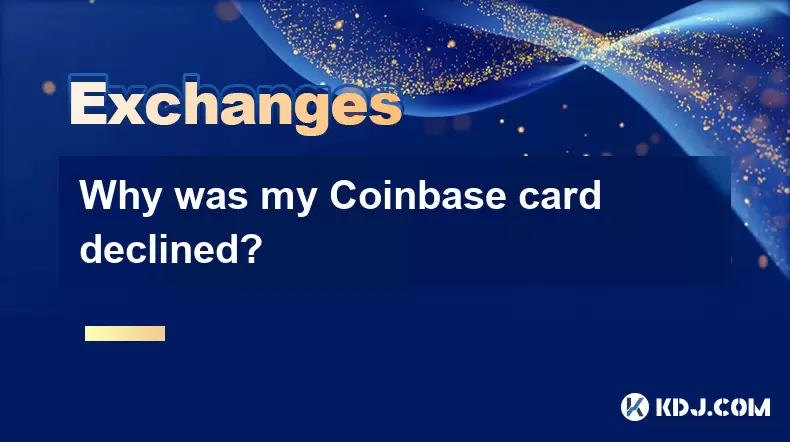
Common Reasons for a Coinbase Card Decline
If your Coinbase card was declined, there could be several potential reasons behind it. One of the most common causes is insufficient funds in your linked account. The card draws directly from your cryptocurrency balance, and if you don’t have enough in your wallet to cover the transaction, the payment will not go through. Another possible reason is that your card has not been activated yet. Before using the Coinbase card, users must complete the activation process either through the app or by making a small purchase.
Additionally, your card may be declined due to an expired card. Like traditional credit or debit cards, crypto cards also have expiration dates. If you're trying to use an outdated card, the system will reject the transaction. Also, some merchants may not accept cryptocurrency-based cards, which can result in a decline even if all other conditions are met.
Technical Issues with the Coinbase App or Network
Sometimes, the problem lies not with your account but with the Coinbase platform itself. Server outages or maintenance on Coinbase’s end can lead to temporary declines. You can check the official Coinbase status page or their social media channels to see if there are ongoing issues affecting the card service.
Another technical issue could involve connectivity between the card network (such as Visa or Mastercard) and the merchant’s payment processor. If there's a disruption in this chain, your transaction might fail even if your card and account are in good standing. In such cases, waiting a short while and trying again often resolves the issue.
Security and Verification Flags
Coinbase employs advanced fraud detection systems to protect user accounts. If a transaction appears suspicious — for example, if you're making a large purchase or buying something unusual based on your spending history — the system may block the transaction automatically. This is a security measure designed to prevent unauthorized use of your card.
Furthermore, if your identity verification is incomplete or outdated, Coinbase may restrict certain transactions. Users are required to go through KYC (Know Your Customer) procedures, and any mismatch in personal details can cause a transaction to be denied. To resolve this, make sure your government-issued ID is up to date in your profile and that all personal information matches exactly what’s on file.
Merchant Restrictions and Geographical Limitations
Not all merchants accept cryptocurrency-based cards. Some businesses may have internal policies or agreements with traditional banks that prevent them from accepting payments via crypto cards. In such cases, the decline is not due to your account but rather the merchant's payment gateway settings.
Also, geographical restrictions may apply. While Coinbase cards are accepted globally, there could be limitations depending on your location or the country where the merchant operates. For instance, certain financial regulations in specific countries may limit the functionality of crypto cards. If you're traveling or shopping internationally, ensure that your card is enabled for international use within the Coinbase app settings.
Card-Specific Settings and Limits
Each Coinbase card comes with customizable settings that allow users to control how and when the card is used. If you've set spending limits, restricted online purchases, or disabled contactless payments, these preferences can lead to a declined transaction. Check your card settings in the Coinbase app to ensure that the type of transaction you're attempting is permitted.
In addition, daily spending caps enforced by Coinbase may also result in a declined card. These limits are in place to protect against fraudulent activity and can vary depending on your account verification level. If you've reached your daily limit, you’ll need to wait until it resets before making further purchases.
Steps to Resolve a Coinbase Card Decline
- Ensure that your card is activated through the Coinbase app
- Verify that you have sufficient funds in your crypto wallet
- Confirm that the card hasn't expired and needs replacement
- Review your card settings for spending limits or restrictions
- Check for any pending verification requirements in your account
- Try the transaction again after waiting a few minutes in case of a technical glitch
If none of these steps work, reach out to Coinbase support for assistance. Provide them with the transaction details, including the time, merchant name, and amount, so they can investigate the issue more effectively.
Frequently Asked Questions
Q: Can I use my Coinbase card at ATMs?
Yes, the Coinbase card can be used at ATMs that accept Visa or Mastercard, depending on the card type you received. However, ATM withdrawals may incur fees and are subject to daily limits.
Q: How long does it take to receive a new Coinbase card?
After ordering a replacement or new card, it typically takes 5–10 business days to arrive, though delivery times may vary depending on your location.
Q: Does the Coinbase card earn rewards?
Yes, the Coinbase card offers cashback rewards in the form of crypto. The percentage varies based on the card tier you qualify for, ranging from 1% to 4%.
Q: Is the Coinbase card free?
There are no monthly fees for the Coinbase card. However, fees may apply for ATM withdrawals, card replacements, and certain types of transactions.
Disclaimer:info@kdj.com
The information provided is not trading advice. kdj.com does not assume any responsibility for any investments made based on the information provided in this article. Cryptocurrencies are highly volatile and it is highly recommended that you invest with caution after thorough research!
If you believe that the content used on this website infringes your copyright, please contact us immediately (info@kdj.com) and we will delete it promptly.
- Cryptocurrency, Altcoins, and Profit Potential: Navigating the Wild West
- 2025-08-04 14:50:11
- Blue Gold & Crypto: Investing Disruption in Precious Metals
- 2025-08-04 14:30:11
- Japan, Metaplanet, and Bitcoin Acquisition: A New Era of Corporate Treasury?
- 2025-08-04 14:30:11
- Coinbase's Buy Rating & Bitcoin's Bold Future: A Canaccord Genuity Perspective
- 2025-08-04 14:50:11
- Coinbase's Buy Rating Maintained by Rosenblatt Securities: A Deep Dive
- 2025-08-04 14:55:11
- Cryptos, Strategic Choices, High Returns: Navigating the Meme Coin Mania
- 2025-08-04 14:55:11
Related knowledge
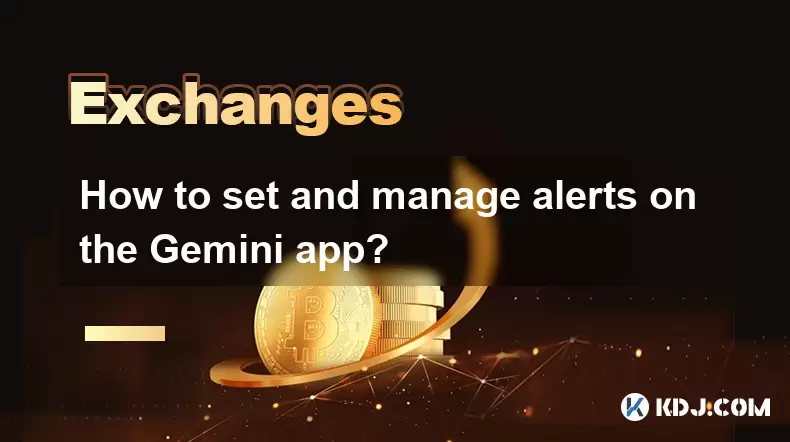
How to set and manage alerts on the Gemini app?
Aug 03,2025 at 11:00am
Understanding the Gemini App Alert SystemThe Gemini app offers users a powerful way to stay informed about their cryptocurrency holdings, price moveme...
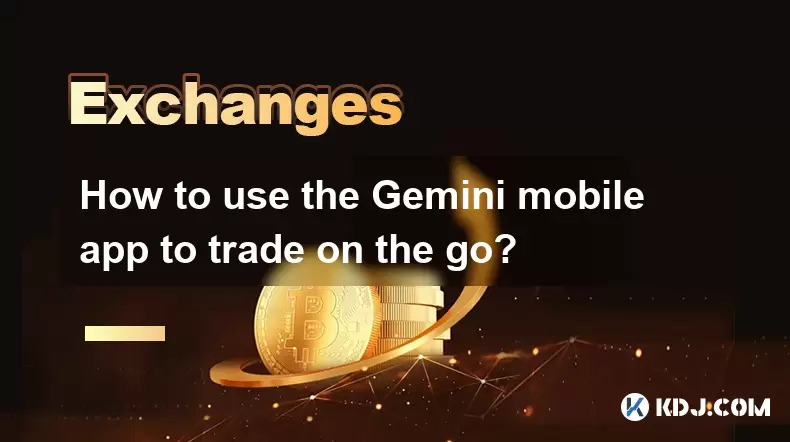
How to use the Gemini mobile app to trade on the go?
Aug 04,2025 at 09:14am
Setting Up the Gemini Mobile AppTo begin trading on the go using the Gemini mobile app, the first step is installing the application on your smartphon...
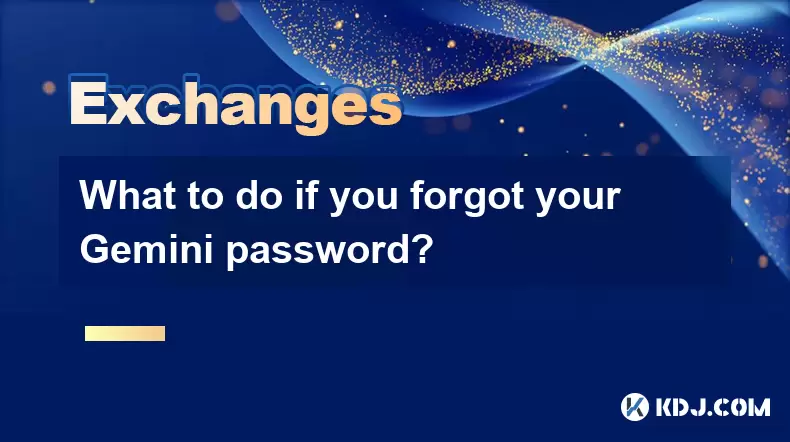
What to do if you forgot your Gemini password?
Aug 04,2025 at 03:42am
Understanding the Role of Passwords in Gemini AccountsWhen using Gemini, a regulated cryptocurrency exchange platform, your password serves as one of ...

What are the websocket feeds available from the Gemini API?
Aug 03,2025 at 07:43pm
Overview of Gemini WebSocket FeedsThe Gemini API provides real-time market data through its WebSocket feeds, enabling developers and traders to receiv...
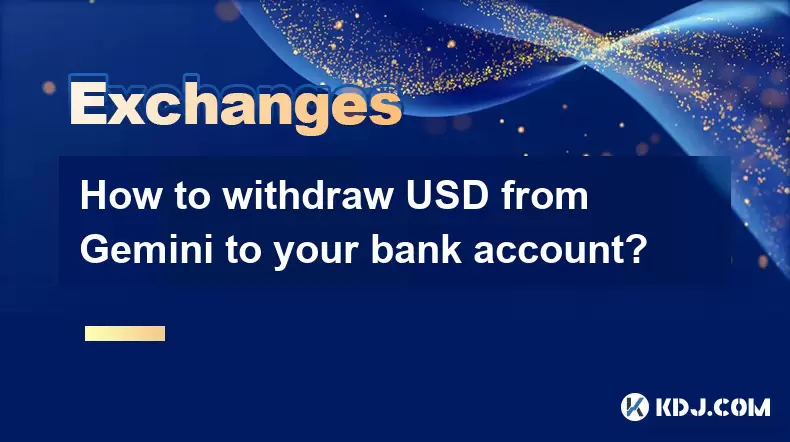
How to withdraw USD from Gemini to your bank account?
Aug 04,2025 at 11:01am
Understanding Gemini and USD WithdrawalsGemini is a regulated cryptocurrency exchange platform that allows users to buy, sell, trade, and store digita...
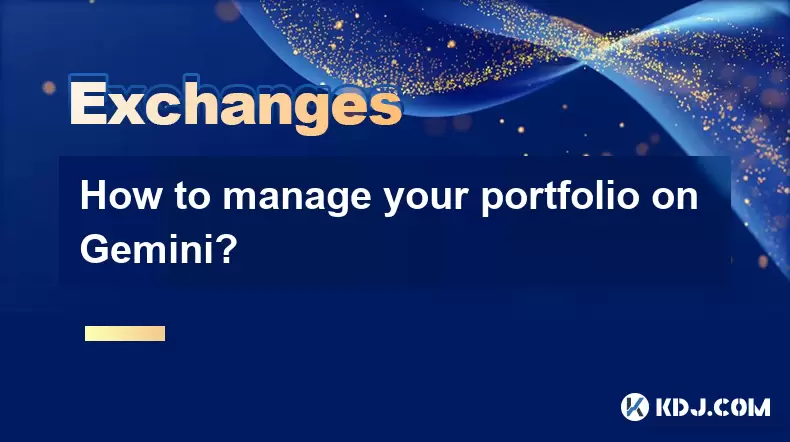
How to manage your portfolio on Gemini?
Aug 03,2025 at 10:36am
Accessing Your Gemini Portfolio DashboardTo begin managing your portfolio on Gemini, you must first log in to your account through the official websit...

How to set and manage alerts on the Gemini app?
Aug 03,2025 at 11:00am
Understanding the Gemini App Alert SystemThe Gemini app offers users a powerful way to stay informed about their cryptocurrency holdings, price moveme...

How to use the Gemini mobile app to trade on the go?
Aug 04,2025 at 09:14am
Setting Up the Gemini Mobile AppTo begin trading on the go using the Gemini mobile app, the first step is installing the application on your smartphon...

What to do if you forgot your Gemini password?
Aug 04,2025 at 03:42am
Understanding the Role of Passwords in Gemini AccountsWhen using Gemini, a regulated cryptocurrency exchange platform, your password serves as one of ...

What are the websocket feeds available from the Gemini API?
Aug 03,2025 at 07:43pm
Overview of Gemini WebSocket FeedsThe Gemini API provides real-time market data through its WebSocket feeds, enabling developers and traders to receiv...

How to withdraw USD from Gemini to your bank account?
Aug 04,2025 at 11:01am
Understanding Gemini and USD WithdrawalsGemini is a regulated cryptocurrency exchange platform that allows users to buy, sell, trade, and store digita...

How to manage your portfolio on Gemini?
Aug 03,2025 at 10:36am
Accessing Your Gemini Portfolio DashboardTo begin managing your portfolio on Gemini, you must first log in to your account through the official websit...
See all articles

























































































